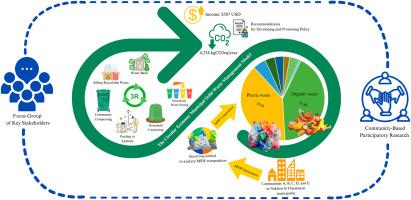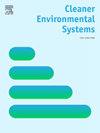通过循环经济城市固体废物管理模式在那空西塔玛拉市进行废物管理和温室气体减排
IF 4.9
Q2 ENGINEERING, ENVIRONMENTAL
引用次数: 0
摘要
气候变化是由人类活动造成的温室气体(GHG)排放驱动的,其中不当的废物管理是一个重要来源。泰国的目标是到2030年将其排放量减少30% - 40%,并将废物处理部门确定为实现这些减排的关键。NST (Nakhon Si Thammarat)是泰国废物管理工作的关键,因为它对城市固体废物(MSW)做出了重大贡献,而且它是南部废物管理不当最多的地区。本研究采用垃圾成分分类方法分析垃圾成分,并采用社区参与式研究方法,包括社区成员、研究人员和利益相关者,在位于NST省的NST市的五个社区开发和实施循环经济城市生活垃圾管理模式。结果显示,研究区域的大部分垃圾由有机和塑料材料组成。实施该模型后,有机废物和塑料废物组成分别减少了6.09% - 11.29%和4.18% - 11.11%,还减少了4234千克二氧化碳当量/年的温室气体排放。此外,该模式每年可产生19 537泰铢的收入。尽管该模型具有灵活性和有效性,但需要改进基础设施并与各种组织协作以支持其运行。综上所述,该研究强调,要实现都市固体废物的可持续管理,政府、地方当局、私营机构和公众等所有利益相关方都必须采取政策支持和全面的废物管理措施。本文章由计算机程序翻译,如有差异,请以英文原文为准。

Waste management and greenhouse gas emission reduction in Nakhon Si Thammarat municipality through a circular economy municipal solid waste management model
Climate change is driven by greenhouse gas (GHG) emissions caused by human activities, of which, improper waste management is a significant source. Thailand aims to reduce its emissions by 30 %–40 % by 2030, identifying the waste sector as crucial for these reductions. Nakhon Si Thammarat (NST) is pivotal in Thailand's waste management efforts due to its major contribution to municipal solid waste (MSW) and its status as the region with the highest amount of improper waste management in the south. This research employed a method for sorting waste composition to analyze waste composition and utilized a community-based participatory research approach, involving community members, researchers, and stakeholders to develop and implement a circular economy MSW management model in five communities within the NST municipality, which is located in the NST province. The results revealed that the majority of waste in the study area consisted of organic and plastic materials. After implementing the model, organic and plastic waste composition were reduced by 6.09 %–11.29 % and 4.18 %–11.11 %, respectively, which also mitigated GHG emissions by 4,234 kgCO2eq/year. In addition, the model could generate an income of 19,537 Baht per year. Despite the model's flexibility and effectiveness, improvements in infrastructure and collaboration with various organizations are needed to support its operation. In conclusion, the study emphasizes that policy support and comprehensive waste management initiatives involving all relevant stakeholders such as government, local authorities, the private sector, and the public are essential for sustainable MSW management.
求助全文
通过发布文献求助,成功后即可免费获取论文全文。
去求助
来源期刊

Cleaner Environmental Systems
Environmental Science-Environmental Science (miscellaneous)
CiteScore
7.80
自引率
0.00%
发文量
32
审稿时长
52 days
 求助内容:
求助内容: 应助结果提醒方式:
应助结果提醒方式:


